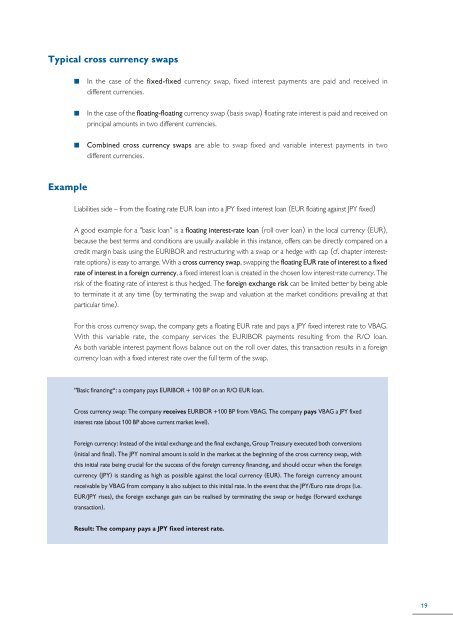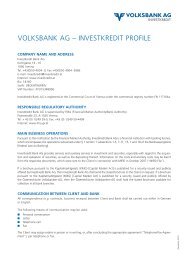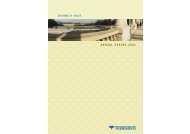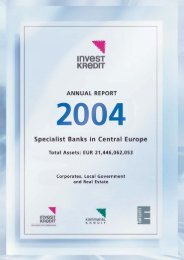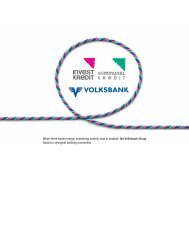instruments in interest-rate, currency and ... - Volksbank AG
instruments in interest-rate, currency and ... - Volksbank AG
instruments in interest-rate, currency and ... - Volksbank AG
Create successful ePaper yourself
Turn your PDF publications into a flip-book with our unique Google optimized e-Paper software.
Typical cross <strong>currency</strong> swapsnIn the case of the fixed-fixed <strong>currency</strong> swap, fixed <strong>in</strong>terest payments are paid <strong>and</strong> received <strong>in</strong>different currencies.nIn the case of the float<strong>in</strong>g-float<strong>in</strong>g <strong>currency</strong> swap (basis swap) float<strong>in</strong>g <strong>rate</strong> <strong>in</strong>terest is paid <strong>and</strong> received onpr<strong>in</strong>cipal amounts <strong>in</strong> two different currencies.nComb<strong>in</strong>ed cross <strong>currency</strong> swaps are able to swap fixed <strong>and</strong> variable <strong>in</strong>terest payments <strong>in</strong> twodifferent currencies.ExampleLiabilities side – from the float<strong>in</strong>g <strong>rate</strong> EUR loan <strong>in</strong>to a JPY fixed <strong>in</strong>terest loan (EUR float<strong>in</strong>g aga<strong>in</strong>st JPY fixed)A good example for a ”basic loan” is a float<strong>in</strong>g <strong>in</strong>terest-<strong>rate</strong> loan (roll over loan) <strong>in</strong> the local <strong>currency</strong> (EUR),because the best terms <strong>and</strong> conditions are usually available <strong>in</strong> this <strong>in</strong>stance, offers can be directly compared on acredit marg<strong>in</strong> basis us<strong>in</strong>g the EURIBOR <strong>and</strong> restructur<strong>in</strong>g with a swap or a hedge with cap (cf. chapter <strong>in</strong>terest<strong>rate</strong>options) is easy to arrange. With a cross <strong>currency</strong> swap, swapp<strong>in</strong>g the float<strong>in</strong>g EUR <strong>rate</strong> of <strong>in</strong>terest to a fixed<strong>rate</strong> of <strong>in</strong>terest <strong>in</strong> a foreign <strong>currency</strong>, a fixed <strong>in</strong>terest loan is created <strong>in</strong> the chosen low <strong>in</strong>terest-<strong>rate</strong> <strong>currency</strong>. Therisk of the float<strong>in</strong>g <strong>rate</strong> of <strong>in</strong>terest is thus hedged. The foreign exchange risk can be limited better by be<strong>in</strong>g ableto term<strong>in</strong>ate it at any time (by term<strong>in</strong>at<strong>in</strong>g the swap <strong>and</strong> valuation at the market conditions prevail<strong>in</strong>g at thatparticular time).For this cross <strong>currency</strong> swap, the company gets a float<strong>in</strong>g EUR <strong>rate</strong> <strong>and</strong> pays a JPY fixed <strong>in</strong>terest <strong>rate</strong> to VB<strong>AG</strong>.With this variable <strong>rate</strong>, the company services the EURIBOR payments result<strong>in</strong>g from the R/O loan.As both variable <strong>in</strong>terest payment flows balance out on the roll over dates, this transaction results <strong>in</strong> a foreign<strong>currency</strong> loan with a fixed <strong>in</strong>terest <strong>rate</strong> over the full term of the swap.”Basic f<strong>in</strong>anc<strong>in</strong>g“: a company pays EURIBOR + 100 BP on an R/O EUR loan.Cross <strong>currency</strong> swap: The company receives EURIBOR +100 BP from VB<strong>AG</strong>. The company pays VB<strong>AG</strong> a JPY fixed<strong>in</strong>terest <strong>rate</strong> (about 100 BP above current market level).Foreign <strong>currency</strong>: Instead of the <strong>in</strong>itial exchange <strong>and</strong> the f<strong>in</strong>al exchange, Group Treasury executed both conversions(<strong>in</strong>itial <strong>and</strong> f<strong>in</strong>al). The JPY nom<strong>in</strong>al amount is sold <strong>in</strong> the market at the beg<strong>in</strong>n<strong>in</strong>g of the cross <strong>currency</strong> swap, withthis <strong>in</strong>itial <strong>rate</strong> be<strong>in</strong>g crucial for the success of the foreign <strong>currency</strong> f<strong>in</strong>anc<strong>in</strong>g, <strong>and</strong> should occur when the foreign<strong>currency</strong> (JPY) is st<strong>and</strong><strong>in</strong>g as high as possible aga<strong>in</strong>st the local <strong>currency</strong> (EUR). The foreign <strong>currency</strong> amountreceivable by VB<strong>AG</strong> from company is also subject to this <strong>in</strong>itial <strong>rate</strong>. In the event that the JPY/Euro <strong>rate</strong> drops (i.e.EUR/JPY rises), the foreign exchange ga<strong>in</strong> can be realised by term<strong>in</strong>at<strong>in</strong>g the swap or hedge (forward exchangetransaction).Result: The company pays a JPY fixed <strong>in</strong>terest <strong>rate</strong>.19


